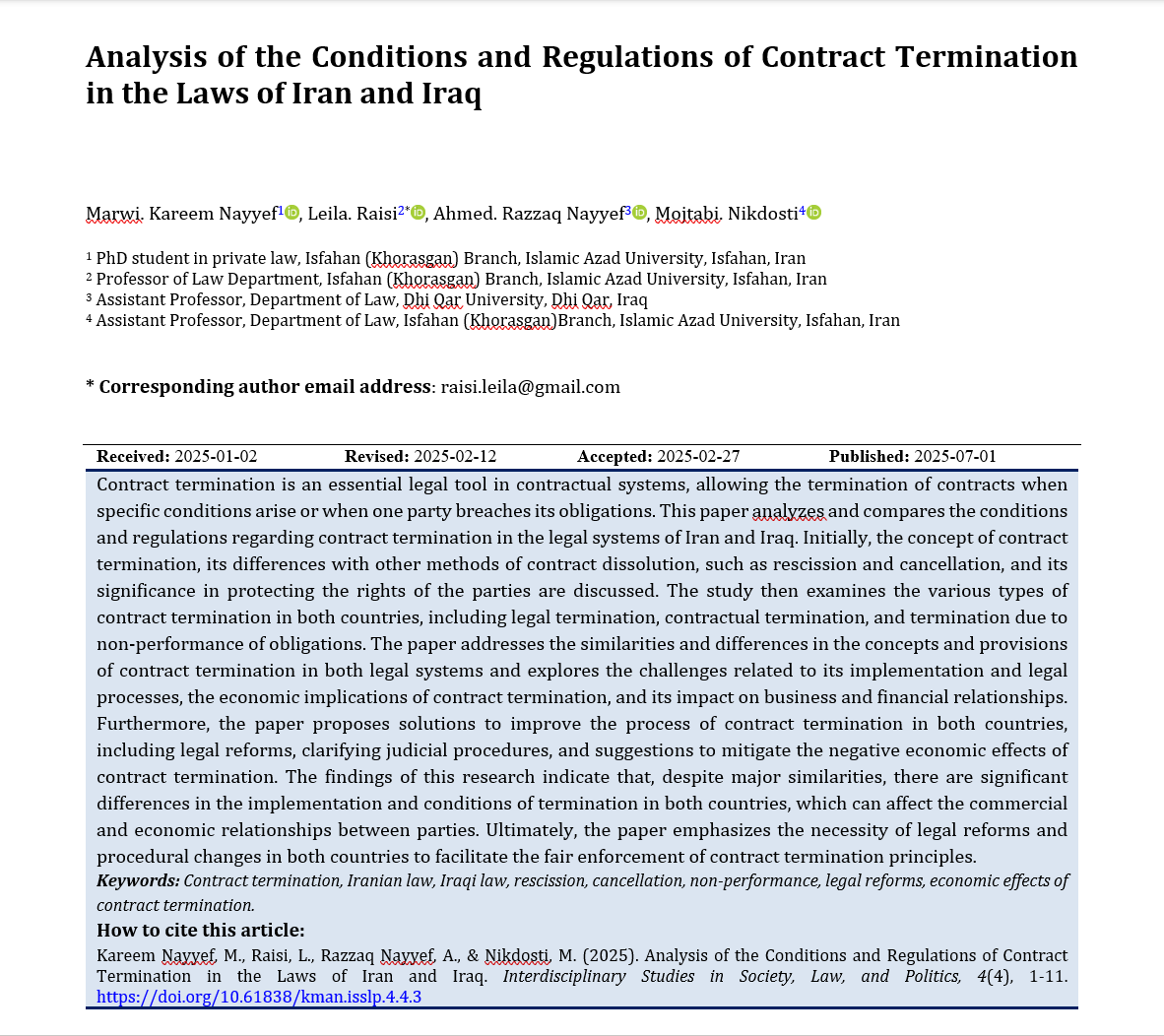Analysis of the Conditions and Regulations of Contract Termination in the Laws of Iran and Iraq
Keywords:
Contract termination, Iranian law, Iraqi law, rescission, cancellation, non-performance, legal reforms, economic effects of contract terminationAbstract
Downloads
References
Abdullah, A. (2017). Legal Analysis of Oil Contracts in Iran: A Study of Mining Laws. Parseh Publishing.
Abed, R. F. (2021). Terms of Reference of the Iraqi Commercial Court. Akkad Journal of Law and Public Policy, 1(1), 16-23. https://doi.org/10.55202/ajlpp.v1i1.63
Al-karawi, S. N. (2018). Challenges Facing Construction Contracts in Iraq. Journal of Engineering and Sustainable Development, 2018(04), 192-201. https://doi.org/10.31272/jeasd.2018.4.14
Kaviani, A. (2012). Limitations of Contractual Freedom in Iranian Law Master's Thesis in Private Law, Shahid Beheshti University Law School].
Khodadadi, H., & Mazaheri Kouhestani, R. (2020). Comparative Analysis of the Role of Consideration and Common Trust in Contractual Obligations in Iranian and English Law. Comparative Law Studies.
Mahmoudi, S. F. (2016). The Position of Specific Options in Sales Contracts in Iranian Civil Law. Journal of Law and Jurisprudence Studies in Political Science, 2(2), 88-96.
Mir Abbasi, S. B. (1998). The Issue of International Contracts under Articles 77 and 139 of the Constitution of the Islamic Republic of Iran. Journal of Law and Political Science Faculty(42).
Mohammadi, S., & Kadivar, H. (2016). Efficient Breach of Contract in Iranian Law. Private Law, 13(2), 101-124.
Pourafshar, O., Barmayehvar, B., Esmaeilabadi, R., & Asnaashari, E. (2021). Contract Risk Analysis in Transportation Infrastructure Projects Based on Public-Private Partnership (PPP) Method. Civil Infrastructure Researches, 7(1), 189-210. https://doi.org/10.22091/cer.2021.7374.1299
Rahbar, M., dashab, m., ameri, f., & emami meibodi, a. (2021). Classification and Identifying the optimal contract structure for Iranian gas export projects via LNG using theELECTRE-TRI technique. new economy and trad, 16(2), 87-118. https://doi.org/10.30465/jnet.2021.7408
Safizadeh, S. (2022). The Role of Registration in Contractual Transfer of Immovable Property in Iran: A Comparative Study with English, Swiss, and French Law. Judiciary Legal Journal(118).
Shafiee, K. (2018). Technopolitics of a Concessionary Contract: How International Law Was Transformed by Its Encounter With Anglo-Iranian Oil. International Journal Middle East Studies, 50(4), 627-648. https://doi.org/10.1017/s0020743818000909

Downloads
Additional Files
Published
Submitted
Revised
Accepted
Issue
Section
License
Copyright (c) 2025 Marwi Kareem Nayyef, Leila Raisi , Ahmed Razzaq Nayyef, Mojtabi Nikdosti (Author)

This work is licensed under a Creative Commons Attribution-NonCommercial 4.0 International License.





